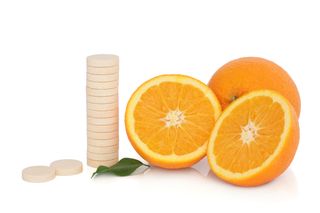Does Vitamin C Really Help Colds?

Each week, MyHealthNewsDaily asks the experts to answer questions about your health. This week, we asked nutrition and infectious disease experts: Does vitamin C help prevent or treat colds?
Joy Dubost, registered dietician and spokesperson for the American Dietetic Association
The science shows that overall, regular ingestion of vitamin C had no effect on the common cold, as far as in the incidence (or how common colds are). Now, most of these studies looked at people who took more than 2,000 mg of vitamin C, which is a very large dose.
The recommended dietary allowance, or RDA, is 75 mg for most adults, and 2,000 mg is the upper limit — you don't want to go over that because you'll have gastrointestinal distress.
[Vitamin C] does support a healthy immune system. So if you're not getting enough vitamin C, you will be more susceptible to colds. If you are taking vitamin C while you have a cold, it could prevent complications such as pneumonia by boosting your immune system.
****
Dr. Mark Levine, chief of molecular and clinical nutrition in National Institute of Diabetes and Digestive and Kidney Diseases
Sign up for the Live Science daily newsletter now
Get the world’s most fascinating discoveries delivered straight to your inbox.
For the average person, vitamin C supplements for colds don't do much of anything, and I don't recommend them. After I say that I like to explain why: There are a lot of trials on vitamin C and colds, of variable quality and people analyze these, so there are analyses of analyses.
You can take vitamin C to prevent colds, or you can take vitamin C once you have a cold to treat it. The treatment trials show a modest benefit. But the reality is in terms of that effect, I don't think it has clinical meaning. In the prophylaxis trials — and prophylaxis means to prevent — the prophylaxis trials [show] in the average person, [Vitamin C doesn't] prevent colds.
Our bodies are configured to keep vitamin C levels within a particular range… As you take in more vitamin C, the amount you absorb from each dose goes down. Then once it is absorbed and goes in the blood, there are proteins on the cell that bring vitamin C into the tissue, and those proteins can't work any faster. Then the excess vitamin C is excreted through the kidneys.
Overall, I say eat more fruits and vegetables.
****
Dr. William Schaffner, chairman of the department of preventive medicine at Vanderbilt University School of Medicine in Nashville, Tenn.
In terms of vitamin C for colds, we need to separate prevention from treatment. On the prevention side the studies are clearly divided. There are some studies that show that taking Vitamin C – usually in fairly large doses – provides some protection against the common cold. But there other studies that show no effect. There are studies of different sizes and quality on both sides of the conclusions. So we (as doctors) have not voted on that one yet.
But, I would say this: that the people who usually advocate taking vitamin C usually advocate taking it in fairly large doses. If you take vitamin C in fairly large doses you're going to excrete a lot of it out in your urine. And if you're dehydrated, that vitamin C is going to form little crystals, which can be painful. So make sure you're drinking lots of water if you are taking vitamin C.
In terms of treatment – there's no evidence that it shortens the course or reduces the symptoms. In other words, there's no evidence that it makes your cold feel better.
***
Dr. Aaron E. Glatt, spokesman for the Infectious Diseases Society of America and professor of clinical medicine, NY Medical College in Rockville Centre, NY
The general answer is probably not a lot. Vitamin C has a checkered history in terms of some studies showing mild benefits, while other studies do not show benefits for upper respiratory viral infections like the common cold. On the whole, I don't think that vitamin C is something people should be jumping to take beyond the regular dietary recommendations.
When you deal with any supplement and you are taking very large doses, it can potentially be problematic. There have been reports of complications and side effects from high doses of supplements, and studies have never demonstrated that super-pharmacological doses are helpful for any disease. In essence, by taking such large doses you are just potentially taking health risks and having an unnecessary expense.
I just tell people to have a normal diet, and drink a glass of orange juice or two if you like. I do not recommend taking high doses of any supplements.
***
Shelley McGuire, national spokesperson for the American Society for Nutrition and an associate professor of nutrition at Washington State University
What we know is that people who eat a lot of naturally occurring vitamin C in foods, do have a lower risk for the common cold. However when scientists isolate just vitamin C and do studies, they're very rarely able to show vitamin C reduces the incidence (how often someone catches a cold) or the severity of a cold.
There is some evidence that people who are in stressful situations — and by that I mean people who are marathon runners, soldiers or people training in the arctic — may benefit from some sort of vitamin C supplementation in terms of incidence of their colds. That may be because their vitamin C requirements may be higher.
So it's kind of a mixed bag. The problem with science sometimes is that we try to reduce these foods down to a specific nutrient and it's probably way more complex than that. Nutrients don't work in isolation, they don't, they work with other nutrients.

Most Popular


